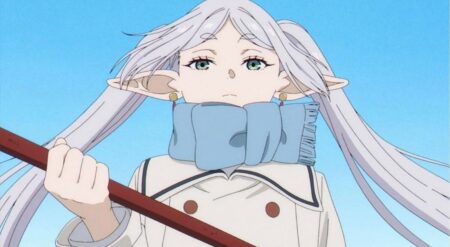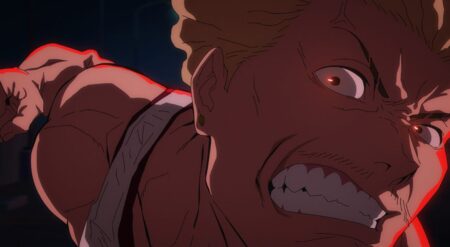
Dragon’s Dogma is a dark fantasy Netflix Original anime series. Ethan lives a quiet life in a small village with his wife. Things are going well for the young couple who are expecting their first child. Until the dragon comes. Upon arriving at their village, the dragon wreaks havoc killing most of the inhabitants, including Ethan’s wife and unborn child. When the dragon sees Ethan’s rage at him, and how he doesn’t seem to fear the dragon, he spares Ethan’s life. Instead, the dragon takes Ethan’s heart, turning him into an Arisen. The dragon then departs. But not without challenging Ethan to find him. So, Ethan sets out to avenge his family, and slay the dragon.
Dark fantasy has been the preferred style of fantasy for what feels like over a decade now. Rarely are the straight forward tales of good vs evil presented in favor of stories loaded with characters of dubious moral quality, and no clear cut heroes.
These tales often try to shine a light on humanity’s baser qualities and instincts. Whether done to be cautionary or accusatory, such tales need to be handle with a delicate touch. Go in too heavy, and the world the story takes place in is so bad you don’t care about anyone. Everyone has whatever I’ll fate befalls them coming it seems. On the other hand, if the story goes too lightly, giving explanations and expectations for everyone, the tale simply feels like the writers are apologists for their characters’ every flaw. While Dragon’s Dogma does a sound job of balancing its darkness with its light, it finds an entirely different stumbling block to fall over. Its use of magic.
Each of Dragon’s Dogma’s seven episodes in its season is named for one of the seven deadly sins. In some cases, the sin is clearly used in a fashion that exemplifies both the sin, as well as the terrible nature of the human that exhibits it. For example, greed’s episode focuses on a mayor who uses the threat of a nearby cyclops to keep his villagers in line, as well as overtax them. Leaving him with riches while his people starve.
However, other sins are presented in cases where the individuals that are supposed to be representing the chosen vice are clearly under magical influences. With the vagueness of how magic works in Dragon’s Dogma’s setting, it is impossible to tell whether or not it would be possible for the average person to resist these pulls, but it comes across like these examples are more victims of circumstance than actual bad people. And then, we have sloth.
For any not familiar, as it is one of the lesser talked about ones, sloth is another word for laziness. The example of sloth used in Dragon’s Dogma takes the form of a young man who, having been forced to work in a mine all his life harvesting a moss that functions as an opiate, has become addicted to the substance. When the rest of the town flees due to fear that the dragon may come he, and his girlfriend, stay behind. Primarily because he doesn’t want to leave the source of his addiction.

What little we learn of the duo’s past tells us they did not come to this mine willingly. Treating a case of drug addiction that was probably born of a need to deal with being in a slave labor mining operation as “slothfulness” feels crass at best, and downright hurtful at worst. It ignores everything we know about addiction, and vilifies the victim. Beyond Dragon’s Dogma’s hit or miss approach to its general themes, it does a good job propelling the overall narrative of the story, thanks to it’s two main protagonists. Ethan and Hannah.
As a small town hunter, Ethan is a bit lost in the larger world. All he knows is he must find the dragon and slay it. This becomes his single purpose the moment the dragon steals his heart and makes him an Arisen. As an Arisen, what he is, or how being an Arisen might help him in this quest, is never made clear. He seems to have heightened physical prowess, but that could just be the stylization of the combat. But while he doesn’t know much, he luckily has someone sworn to protect him. He has Hannah.
After Ethan’s confrontation with the dragon leaves him changed, a woman appears identifying herself as a pawn, and stating that she was drawn here because of Ethan’s new status as an Arisen. With no name of her own, Ethan gives her the name Hannah. Hannah knows a lot but is almost devoid of emotions or understanding of things that aren’t cut and dry book knowledge. Ethan tells her their goal is to kill the dragon, and that’s it. So, that is all Hannah concerns herself with. At least at first.
Shortly after the duo leaves Ethan’s village they are almost instantly waylaid by other people’s problems. Hannah assumes they will just move on, as they have no connection to killing the dragon. Ethan however, cannot help but lend his aid. This is where Dragon’s Dogma’s greatest strength comes in.
The asymmetrical character arcs of Ethan and Hannah are handled extremely well. As Hannah travels with Ethan she grows as an emotional being. Coming to understand and appreciate why Ethan needs to help others. But as the series nears it’s finale Ethan grows in the direct opposite direction. Becoming more and more consumed with his all-encompassing need to slay the dragon. One cannot help but feel for Hannah as she quickly begins to lose the kindhearted friend she just made.
The last element of Dragon’s Dogma is its visuals. These sadly, are not the best. The characters generally feel wooden in their movements, causing facial expressions and body langue to often fail in delivering the emotions that they are trying to convey to their fullest.
As well as the sub-par animation, the character designs, by and large, are forgettable. The various monsters that appear in the show each impart the most basic examples of their creature types. Along with these forgettable monster designs, the characters, with the exception of our two protagonists, also lack anything to make them particularly memorable.
When all is said and done, Dragon’s Dogma is a mixed bag. While delivering some solid character development from its stars, it fails to be better than average in most other respects. With several quality animation options already on Netflix’s service, there are defiantly superior choices out there. But, with the entire season lasting under three hours, if you are looking for something dark and magical, given it’s short run time, it certainly has its merits.
Dragon’s Dogma is streaming now exclusively on Netflix.
Dragon’s Dogma
-
Rating - 7/107/10
Summary
Dragon’s Dogma is a mixed bag. While delivering some solid character development from its stars, it fails to be better than average in most other respects. With several quality animation options already on Netflix’s service, there are defiantly superior choices out there. But, with the entire season lasting under three hours, if you are looking for something dark and magical, given it’s short run time, it certainly has its merits.






